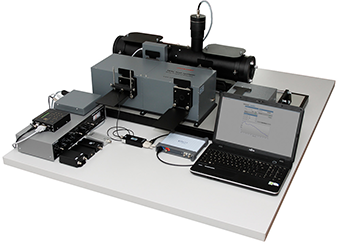Discrete detectors
Testing discrete optical detectors at variable wavelenght selected by monochromators looks easy. The monochromators are spectral systems invented over 100 hundred years ago and offered by many manufacturers. It is easy to use monochromator as a system that transmit optical light at variable wavelngth used for relative measurements like measurement of transmission of optical windows. . However, it is surprisingly difficult to built a system capable to measure accurately absolute values of radiometric parameters of optical detectors at variable wavelenght (especially at MWIR/LWIR band). Accurate measurement of parameters of optical detectors is possible only after taking into account complex physical phenomenon that infleunce work of light sources, modulators, attenuators, monochromators, electronic amplifiers and mastering calculation of such parameters. Due to high requirements on know how there are only several manufacturers of systems for testing optical detectors. Inframet belongs to a small elite group of manufacturers of systems for testing discrete optical detectors.
Inframet offers two test staions for testing discrete optical detectors:
- TRAL : advanced universal system for accurate direct measurement of all important parameters of discrete optical detectors at regulated wavelength,
- TRAK: economic system for simplified testing of IR discrete detectors.
 TRAL |
 TRAK |
Data sheets:
If you have further questions please contact us.
